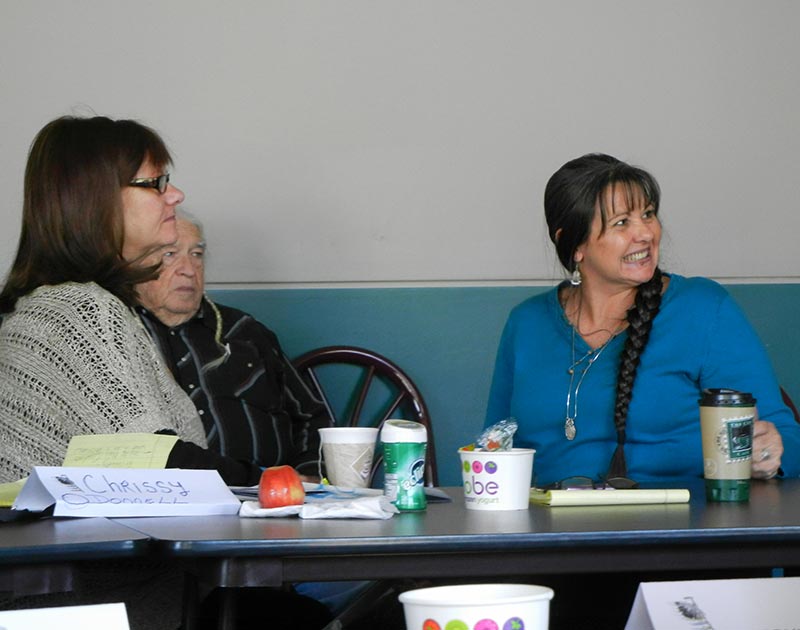Native Patient Navigator Training
Training Introduction
 Patient Navigation Resource Center
Patient Navigation Resource Center
Enroll now and take advantage of cutting edge training in patient navigation and native patient navigation. Enjoy the opportunity to select the topics that you want and increase your knowledge and skills for working with Indigenous (American Indian, Alaska Native, Aboriginal, First Nations, Pacific Islanders, and others) cancer patients. Improve your ability to meet the challenges of working in the community with patients and in the hospital and/or clinic.
NACI conducts an average of ten 4.5-hour Native Patient Navigation trainings each calendar year. At the present time, all scheduled trainings are full; Please contact Linda B (Burhansstipanov@gmail.com) and Lisa H (lisaharjo@aol.com) to schedule either a virtual or in-person training for your program.
Overview of Native PN
- PN Definitions & Roles (45mins)
- Describe the origins and rationale for patient navigation
- Identify other positions than may include patient navigation roles or tasks
- Identify PN roles
- PN Navigating HC system in and out of Indian Country (45mins)
- PN & Cancer Continuum (45mins)
- PN Collaborating with HC Team (30mins)
- PN Safety (90mins)
- PN Resources & Resource Guide (45mins)
History and Cultural Framework Related to PN
- AI / AN history and impact on perceptions and healthcare (45mins)
- Optional: historical trauma (40min)
- Optional: AI sterilization (30min)
- Optional: Havasupai (30min)
- Cultural competency with AI/AN settings (45mins)
Implementing & Interpreting Assessment Tools
- National Comprehensive Cancer Network's Problem List (40 min)
- McCorkle's Stress / distress Scale (30mins)
- Patient's goals and preferences (30mins)
- Barriers and Solutions (60mins)
- Patient Satisfaction with Patient Navigation Program (30mins)
- Patient Satisfaction with Patient Navigator (30mins)
- Survivorship care plans (60mins)
- Quality of life (30mins)
- Fatigue (30mins)
- Pain (30mins)
- Navigation Acuity Tool (45 mins; NOTE: AONN+ has not yet released this tool)
- Needs assessments (30mins)
- Patient Literacy (30mins)
AI/AN Patient Life Goal Setting & Culture
- Emotionally challenging situations (60mins)
- Advanced directives (90mins)
- Final legal will and testament (with legal representative) (30mins)
- Tribal will and inheritance policies versus non-Native assumptions (40mins)
Outreach Strategies in Non-Native & AI/AN Events
- Informing through tribal newsletters, papers, radio, TV, PSA, or short articles (45mins)
- How to advertise (45mins)
- How to write information articles (Indian Country Today, tribal newspaper) (45mins)
- Participant outreach and recruitment strategies (45mins)
- Outreach at community events: Do's & Don'ts (45mins)
- Exhibit booth protocol (PowWow, health fair) (45mins)
- I/T/U Protocols for promotional products (30mins)
- Critique of informational videos, digital stories in waiting rooms (40mins)
Communication
- Basic verbal, vocal and non-verbal (60mins)
- Elevator speeches (30min; participant activity next day for 20mins)
- Motivational inerviewing (conducted with specialists from the PN training collaborative only) (6hours)
- AI/AN communication patterns & culture (45mins)
- Common AI/AN patient-provider / family issues (75mins)
- Resolving conflict, avoiding common AI/AN miscommunication (45mins)
- I-messages: learning how to ask questions that the AI/AN patient desires and the non-native provider can understand (45mins)
Messages, Materials & Settings
- Messages (phrasing) (40mins)
- Media (format) (40mins)
- Settings (venue) (40mins)
- Creating culturally appropriate products for local AI/AN community (40mins)
- Literacy (40mins)
Evaluating & Tracking PN Tasks and Follow-up
- Forms for evaluating PN actions & the patient navigation program (60mins)
- Evaluation strategies: do's and dont's (40mins)
- How to write effective knowledge, attitude, self-efficacy and behavior questions (45mins)
- Using Audience Response Systems (ARS) (60mins)
- How to write and use effective qualitative questions & responses (30mins)
- Forms and skills evaluating PN work one-on-one (45mins)
- Forms & skills evaluating PN work with small groups (45mins)
- Forms & skills evaluating PN work with family (45mins)
Cancer Content for Cancer-Specific PN
- Native Cancer 100 (overview of cancer) (60mins) and 100b (genes and cancer) (30 mins)
- Describe the process through which normal cells become cancerous
- Describe the difference between benign and malignant tumors
- Describe two types of cancer and where they occur in the body
- Describe statistical trends for cancer among American Indian geographic regions
- Identify genetic principles and terminology related to cancer
- Native Cancer 101 (diagnosing & staging) (60mins)
- Identify ways cancers are diagnosed
- Identify two methods to diagnose, grade and stage cancer
- Provide two reasons why staging is important
- Native Cancer 102 (treatments) (60mins)
- Discuss currently available cancer treatments
- Describe evolving/emerging cancer treatments
- Identify common side effects associated with cancer treatments
- Native Cancer 103 (side effects) (60mins)
- Identify the differences between acute, chronic and late effects of cancer and cancer treatment
- Identify at least 5 strategies for addressing side effects of cancer/cancer treatment
- Keep tobacco sacred (90mins)
Spirit of the EAGLES Native Cancer 101 Modules
- SoE Native Cancer 101 Module 4 (role of genes in cancer) (60mins)
- SoE Native Cancer 101 Module 8 (specimens & biobanks) (90mins)
- SoE Native Cancer 101 Module 9 (chronic conditions, co-morbidities & cancer) (90mins)
- SoE Native Cancer 101 Module 10 (screenable cancers combined) (120mins)
Screenable Cancer Content - Get on the Path to Health Curricula
- Get on the path to breast health (90mins)
- Get on the path to cervical health (90mins)
- Get on the path to colorectal health (90mins)
- Get on the path to lung health (90mins)
- Get on the path to prostate health (90mins)
Non-Screenable Cancer Content for Cancer-Specific PN
- Brain (60mins)
- Endometrial (60mins)
- Lymphoma (90mins)
- Gynecological (60mins)
- Multiple Myeloma (90mins)
- Pancreatic (90mins)
- Kidney (60mins)
- Stomach (60mins)
- Adult Leukemia (60mins)